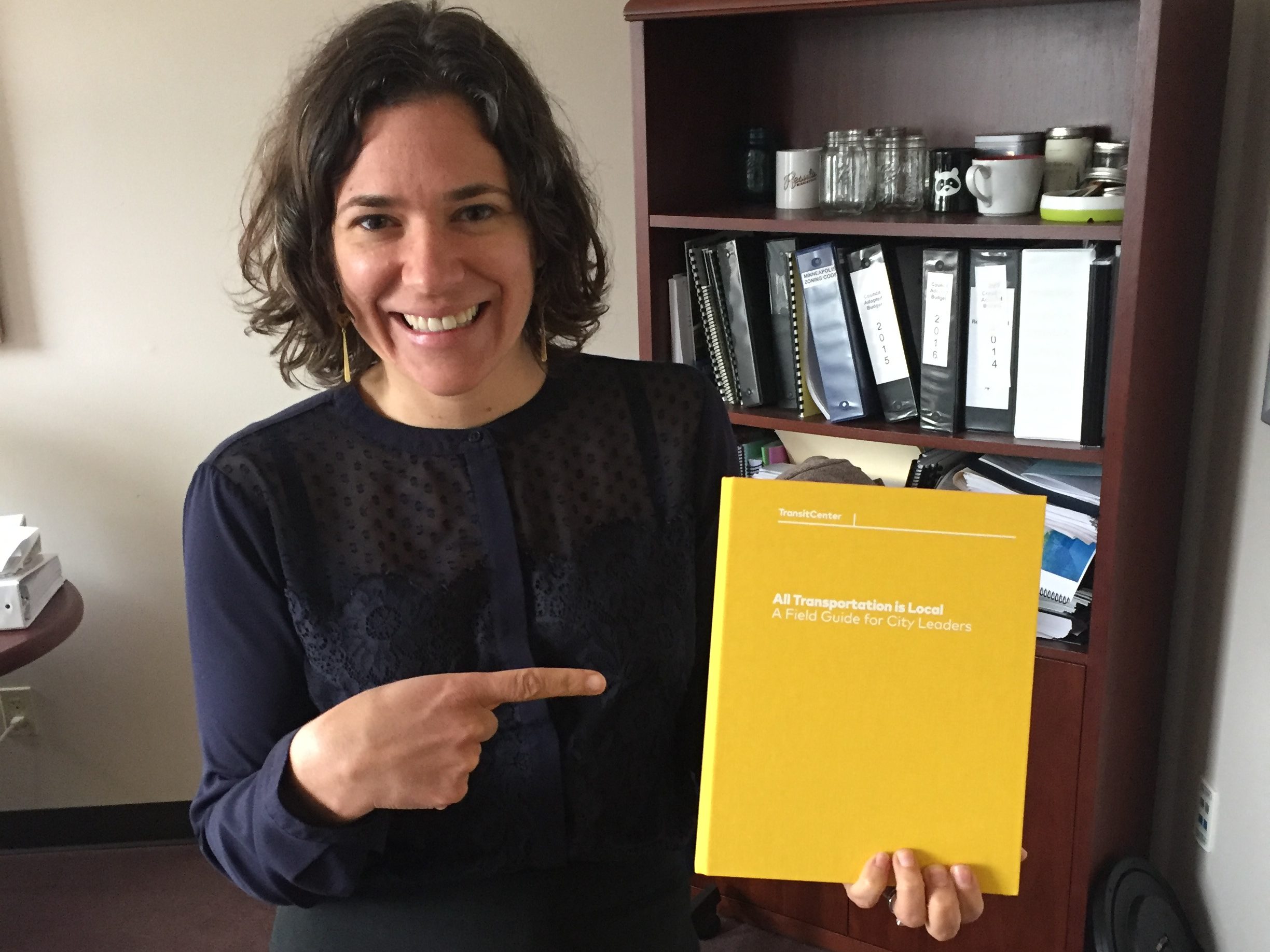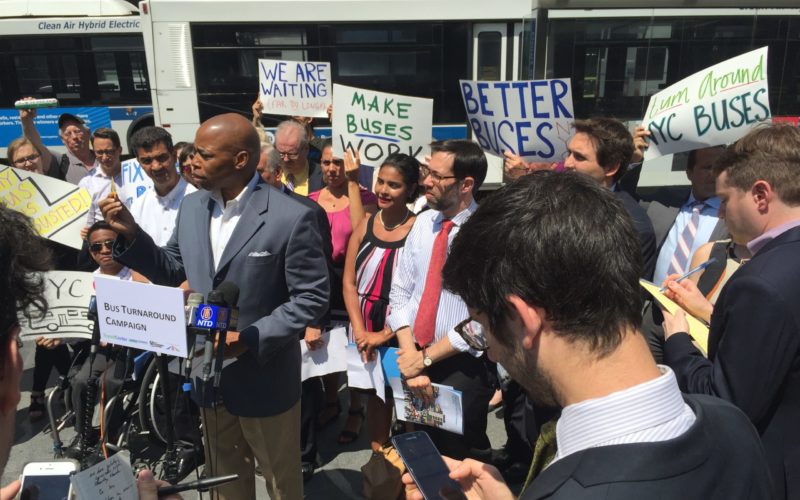
During her time in office, Minneapolis Council Member Lisa Bender has authored numerous policies to create a safer, stronger transportation system, including the city’s Complete Streets Policy, a protected bikeway update to the Bicycle Master Plan, and an ordinance reducing the minimum parking requirement for new residential buildings along high-frequency transit routes. Prior to her election, Bender spent more than a decade in transportation agencies and advocacy groups — from writing and advocacy at the Tri-State Transportation Campaign, co-founding the Minneapolis Bicycle Coalition to writing a plan for safer streets in San Francisco and helping kids walk and bicycle safely as Minnesota’s Safe Routes to School Coordinator.
TransitCenter: Since you were first elected to City Council in 2013, you’ve advanced a number of transportation policies that you previously focused on as an advocate. Now that you’re in office, has your perspective on the policy process shifted?
Lisa: To have a city that is transforming our streets and transit system requires interplay between community advocacy, supportive elected officials, and agency staff. As a policymaker, I now have a much more direct influence over policy, street design, and creating a budget that reflects our values than I did before. So, what is possible definitely shifted since I got elected. We can create momentum by running candidates for office who are explicit in saying “I support safer streets” or “I support better transportation options, and this is what that means.”
TransitCenter: There’s a trend of pro-transit people being elected to public office –– Rob Johnson in Seattle and Brad Lander in New York come to mind. What advice would you give someone who’s looking to make the same move?
Lisa: My number one piece of advice, simply put, is “run.” Often when I speak at conferences, I ask anyone who’s ever been frustrated with their elected officials to raise their hands, and then I tell those people to run for office or support one of their friends who want to run. I think it’s especially important to elect people who have community organizing and public-sector experience. Being an advocate and agency staffer gave me a background on how to move changes through the system. It also gave me a perspective on how to build support for controversial issues, and the skills to articulate a community vision.
TransitCenter: You’ve encountered opposition from business owners and residents who are skeptical of street changes, particularly when it comes to removing parking or traffic lanes to make space for pedestrians, buses, and cyclists. How do you assuage their concerns?
Lisa: Repurposing traffic lanes and parking spaces is always controversial. But Minneapolis now has a Complete Streets Policy that prioritizes pedestrians, transit users, and cyclists over single occupant vehicles. So, we start any community conversation about street changes within this context: Our city has decided to prioritize alternative travel modes based on public feedback and demand for safer streets. Then we go from there.
Sharing factual information is important. Traffic volume, for example, is actually declining in Minneapolis. Sure, we still have rush-hour traffic that feels like it’s getting worse. And people see new housing and buildings rise and cause choke points on streets where there wasn’t traffic before. But, overall, traffic is actually decreasing. That’s an important piece of information for people to have as we begin conversations about complete streets changes.
TransitCenter: Do you think advocacy groups in Minneapolis are taking maximum advantage of the fact that you’re in office?
Lisa: I couldn’t do my job without a strong, healthy advocacy community that organizes constituents to support projects that make our streets safer and more accessible for everyone. Yet advocates sometimes take their friends in elected office for granted and forget that we need as much support as someone whose opinion they are trying to change. That includes turning supporters out to public meetings. If I hold a town hall in which only one viewpoint is represented, it’s hard for me to say to folks, “Well, I know 99% of you spoke in opposition, but believe me when I say that there are hundreds of people out there who disagree with you.” I’ve had to do that before and it puts me in a tough position.
TransitCenter: What more would you like to see from Metro Transit?
Lisa: I’m glad Metro Transit has built a network of suburban commuter lines, but these shouldn’t come at the expense of transit investment in urban neighborhoods. We need to have stronger travel options within neighborhoods where the vast majority of riders already live and where improvements would benefit so many more riders.
TransitCenter: Anything else you’d like people to know?
Lisa: One thing I like most about my job is that I’m able to connect transportation to other issues like land use, climate change, or public health. When you’re an advocate, you often must focus on one issue area, even if the challenges are interrelated. As an elected official, I can say, for example, “OK, if we make these transit investments, how can we make our land use policy match?”
And the budgetary component of my job is so important. Minneapolis spends a lot of money on capital investments, and we can use that money as an equity-building tool in a really explicit and powerful way. So, for example, we’ve begun to consider measurements of equity as we prioritize streets funding within communities of color that have been historically disinvested.
 On the Brink: Will WMATA’s Progress Be Erased by 2024?
On the Brink: Will WMATA’s Progress Be Erased by 2024?
The experience of being a WMATA rider has substantially improved over the last 18 months, thanks to changes the agency has made like adding off-peak service and simplifying fares. Things are about to get even better with the launch of all-door boarding later this fall, overnight bus service on some lines starting in December, and an ambitious plan to redesign the Metrobus network. But all of this could go away by July 1, 2024.
Read More A Bus Agenda for New York City Mayor Eric Adams
A Bus Agenda for New York City Mayor Eric Adams
To create the “state-of-the-art bus transit system” of his campaign platform, Mayor Adams will have to both expand the quantity and improve the quality of bus lanes. We recommend these strategies to get it done.
Read More